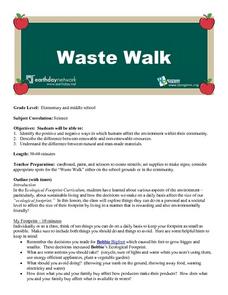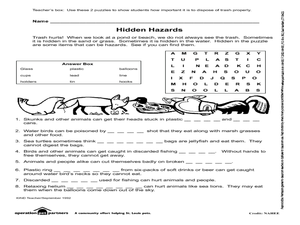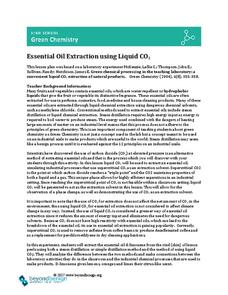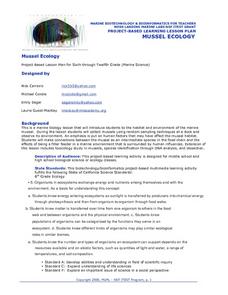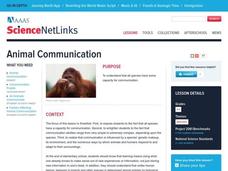Curated OER
Our Environment
Students engage in a literature study that helps students to connect with some of the issues of conservation. They list parts of the environment that need protection with the help of a graphic organizer. Then students discuss in groups...
Curated OER
How Does Climate Affect Your Environment?
Pupils access the Global Sun Temperature Project website and research the relationship between the location and climate of a participating school to its building structure. They consider how climate affects the type of structures humans...
Curated OER
Environment: Waste Walk
Students assess the positive and negative affects of humans on the environment. The lesson explores ways in which individuals and societies can reduce the negative impact on the environment. By taking a "waste walk" around their campus,...
Curated OER
Genes, Environments, and Behavior 2
High schoolers explore how scientists study the genetic and environmental factors that interact to produce variation in behavior across a population.
Curated OER
Making Your Own Sampling Tools
Young scholars examine cause-and-effect relationship between human attitudes and behavior in the environment. They also assist citizens in increasing their sensitivity and stewardship for the environment.
Curated OER
Creating Artwork to Explain Environmental Change
High schoolers review artwork that relates to the environment and communicates a value. They view and analyze art by Andy Warhol, Eric Carle and Albert Bierstadt and then create original pieces with an environmental theme.
Curated OER
Let's Clean Up Our Act and the Earth!
Students complete activities that help clean up the Earth and protect the environment. In this Earth protection lesson, students go outside and listen to the environment. Students discuss their observations and their role in protecting...
Curated OER
Save the Bay!
Students explore environmental protection by creating a presentation in class. In this Chesapeake Bay lesson, students discuss the current threats from human beings towards the delicate balance of life near the bay. Students identify the...
Curated OER
Scientific Inquiry
Students create a poster. In this recycling lesson, students discuss pollution and the ways humans negatively affect the environment. Students describe examples of litter or pollution they have experienced. Students collect litter from...
Curated OER
Our Population and Its Impact on the Planet
Students explore environmental problems due to the growing worldwide human population and examine the growth rate. They also discuss possible ways to stabilize population growth and increase sustainable development.
Beyond Benign
E-Factor: Environmental Impact Factor
Explore how chemical processes reduce production waste. The 19th lesson in a 24-part series has learners explore the impact of green chemistry techniques on waste in production scenarios. They consider petrochemicals, bulk chemicals,...
Beyond Benign
Green House?
A solid foundation is important for all things—especially houses. Learners research different materials for foundations based on environmental impact and cost. They decide whether concrete, insulated concrete, or wood would be best for...
Beyond Benign
Sustainability Bingo
Play a little Bingo and learn a little chemistry. The third installment in a 24-part series gives scholars the opportunity to play a game of Bingo while they review the 12 principles of green chemistry. The principles make up the Bingo...
Beyond Benign
Is It Easy Being Green Game Show
Is it possible to create an environmentally friendly shampoo? Learners accept this challenge in the fifth lesson in a green chemistry series of 24. The analysis of their shampoo ingredients must address pH, exothermic reactions, and...
Beyond Benign
Evaluating Sustainability and Lifecycle
What makes one product greener than another? Ecology scholars analyze sustainability and lifecycle through a thought-provoking activity. Individuals pick a product, then examine its components to determine its overall impact on the world...
Beyond Benign
12 Principle Match Up
Can you find a match? Scholars review the 12 principles of green chemistry by playing a matching game. The second lesson of the series reinforces the principles from the first lesson. Individuals play the matching game and also complete...
Beyond Benign
The Story of Cosmetics Video Assessment
Does your shampoo contain carcinogens? Scholars learn how cosmetic companies create and market their products, many of which contain toxic chemicals. They examine the bias and consumer responsibilities in the industry.
National Wildlife Federation
Fossil Fuel Extraction Activity
Extracting oil is more difficult than many think! Learners work together and get hands-on as they represent oil companies drilling for oil by simulating oil extraction using beans. They identify the challenges faced in using...
Curated OER
The Chesapeake Bay in Captain John Smith's Time
When Captain John Smith visited the Chesapeake Bay in the summer of 1608, what types of animals and habitats did he encounter? Your young historians will analyze primary source documents to answer this question, as well as compare the...
Beyond Benign
Essential Oil Extraction Using Liquid CO2
When life hands you lemons ... experiment on them! Green chemistry gurus compare extraction methods for essential oils through a lab activity. Lab groups use traditional distillation and liquid carbon dioxide extraction methods, then...
Curated OER
Mussel Ecology
Students are introduced to the marine environment of the mussel. The emphasis of the lesson is upon what human factors are present to influence the environment in positive and negative ways. They brainstorm in groups in order to conduct...
Curated OER
Animal Communication
Students understand that all species have some capacity for communication. Students are exposed to the fact that all species have a capacity for communication. They are enlighten to the fact that communication abilities range from very...
Curated OER
Functional Homes
Students observe and reflect on habitats built and used by various life forms. They discover the benefits of the "homes" to the creature and its life and apply the natural designs to human uses.
Curated OER
Where is Everybody?
Middle schoolers collect data from different grade levels at their school and develop thematic maps which show population density, and determine how this might affect the school and themselves in the future.




